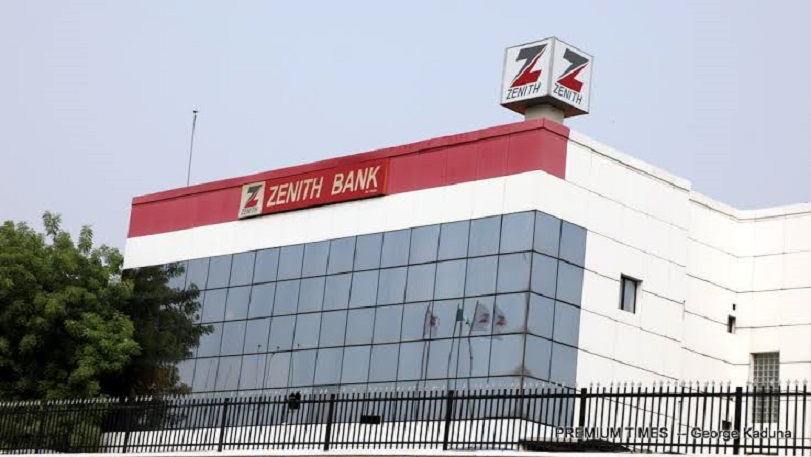Banking
Zenith Bank Offers Shareholders Highest Half year Dividend Pay-out of N1

By Dipo Olowookere
Shareholders of Zenith Bank Plc will receive the highest half-year dividend pay-out of N1 per share in the company’s history for the first half of 2024, Business Post reports.
The board of the lender confirmed this development in the financial statements for the period ended June 30, 2024, filed to the Nigerian Exchange (NGX) Limited over the weekend.
The cash reward, expected to be paid to shareholders in the coming weeks, will also be the highest interim dividend in the Nigerian banking sector to date.
In the first six months of this year, the financial institution posted an impressive triple-digit growth of 117 per cent in gross earnings from N967.3 billion in H1 2023 to N2.1 trillion, largely driven by acceleration in both interest income and non-interest income.
It was observed that the interest income surpassed the N1 trillion mark with a growth of 177 per cent to N1.1 trillion from N415.4 billion in the same period of last year, helped by the growth of and by the effective pricing of risk assets.
On its part, the non-interest income grew by 74 per cent in the period under consideration to N899.3 billion from 515.7 billion.
The results showed that the top line growth, which happened amid a challenging microenvironment, propelled the bottom line, with a 108 per cent year-on-year (YoY) increase in profit before tax to N727 billion from N350 billion in H1 2023 as the post-tax profit jumped by 98 per cent from N292 billion to N578 billion in the same period, leading to a 98 per cent spike in earnings per share (EPS) to N18.41 from N9.29 in H1 2023.
As for the balance sheet, total assets grew by 35 per cent on a year-to-date basis from N20.4 trillion in December 2023 to N27.6 trillion in June 2024, while customer deposits increased by 29 per cent from N15.2 trillion in December 2023 to N19.6 trillion in June 2024, with gross loans up by 44 per cent from N7.1 trillion in December 2023 to N10.2 trillion in June 2024, aided by loans disbursements to customers and the translation effect of foreign currency denominated loans.
However, the organisation’s consistently stringent risk acceptance criteria helped ensure that the non-performing loan ratio continued to show only modest growth, increasing from 4.4 per cent in December 2023 to 4.5 per cent in June 2024 despite the challenging macroeconomic environment.
Policies put in place by the team for operational efficiency resulted in only a marginal increase in the cost-to-income ratio on a y-o-y basis from 38.5 per cent to 39.4 per cent.
But the heightened risk environment has fuelled a growth in impairment levels, thus mildly elevating the cost of risk from 8.8 per cent to 9.7 per cent, with the cost of funds up from 2.6 per cent to 4.4 per cent due to the high-interest rate environment, which also led to growth in interest expense from N153.6 billion in H1 2023 to N434.4 billion in H1 2024.
Despite this, net interest margin grew by 49 per cent from 5.9 per cent in H1 2023 to 8.8 per cent in H1 2024, underscoring the efficient repricing of interest-earning assets and interest-accruing liabilities.
In the period under review, the capital adequacy ratio improved from 21.7 per cent in December 2023 to 23 per cent in June 2024, the loan-to-deposit ratio grew by 11 per cent from 46.5 per cent to 51.7 per cent, while the liquidity ratio reduced from 71 per cent to 59 per cent. All prudential ratios are still well above regulatory thresholds.
Banking
All Set for Second HerFidelity Apprenticeship Programme

By Modupe Gbadeyanka
Registration for the second HerFidelity Apprenticeship Programme (HAP 2.0) organised by Fidelity Bank Plc has commenced.
The Divisional Head of Product Development at Fidelity Bank, Mr Osita Ede, informed newsmen that the initiative was designed to empower women with sustainable entrepreneurship skills.
The lender created the flagship women-empowerment initiative to equip women with practical, income‑generating skills and structured pathways to entrepreneurship.
“HerFidelity Apprenticeship Programme 2.0 reflects our commitment to continuous improvement. Having evaluated feedback from the first edition, we have returned with stronger partnerships and deeper mentorship programmes to ensure that women acquire not just skills, but sustainable economic opportunities,” he said.
“At the heart of the programme is guided, real‑world learning. Participants will undergo intensive apprenticeship training under reputable institutions and industry experts across select fields such as hair styling, shoe making, auto mechatronics, and interior decoration,” Mr Ede added.
He noted that HerFidelity Apprenticeship Programme 2.0 goes beyond skills acquisition by offering participants a wide range of business advisory services. These include business and financial literacy training, mentorship support throughout the apprenticeship journey, access to Fidelity Bank’s women‑focused and SME financial solutions, as well as guidance on business formalisation and growth strategies.
Further emphasising the bank’s vision, Mr Ede said, “By integrating structured mentorship with entrepreneurial development, Fidelity Bank is positioning women not just as trainees, but as future employers, innovators, and economic contributors within their communities. This aligns with our mandate to help individuals grow, businesses thrive, and economies prosper.”
Banking
The Alternative Bank Opens New Branch in Ondo

By Modupe Gbadeyanka
A new branch of The Alternative Bank (AltBank) has been opened in Ondo State as part of the expansion drive of the financial institution.
A statement from the company disclosed that the new branch would support export-oriented agribusinesses through Letters of Credit and commodity-backed trade finance, ensuring that local producers can scale beyond state borders.
For SMEs, the bank is introducing robust payment rails, asset financing for equipment and inventory, and supply chain-backed facilities that strengthen working capital without trapping businesses in interest-based debt cycles.
The Governor of Ondo State, Mr Lucky Aiyedatiwa, represented by his Chief of
Staff, Mr Olusegun Omojuwa, at the commissioning of the branch, underscored the importance of financial institutions in economic development.
“The pivotal role of financial institutions to economic growth and development of any economy cannot be overemphasised. It provides access to capital, supporting small and medium-scale enterprises and encouraging savings.
“Therefore, I have no doubt in my mind that the presence of The Alternative Bank in Ondo State will deepen financial services, create employment opportunities and stimulate economic activities across various sectors,” he said.
In her remarks, the Executive Director for Commercial and Institutional Banking (Lagos and South West) at The Alternative Bank, Mrs Korede Demola-Adeniyi, commended the state government’s leadership and outlined the lender’s long-term vision for Ondo State.
“As Ondo State steps into its next fifty years, and into the future anchored on the sustainable development championed during the recent anniversary celebrations, The Alternative Bank is here to be the financial engine for that vision. We didn’t come to Akure to hang banners. We came to fund work, farms, shops, and factories.”
With Ondo State’s economy anchored largely on agriculture, particularly cocoa production, poultry farming, and other cash crops, alongside a growing SME and trade ecosystem, AltBank is deploying sector-specific financing solutions tailored to these strengths.
For cocoa aggregators, processors and poultry operators, the bank will provide production financing, facility expansion support, machinery lease structures, and structured trade facilities under its joint venture and cost-plus financing models, with transaction cycles of up to 180 days for commodity trades and longer-term structured asset financing for equipment and infrastructure.
The organisation is a notable national non-interest bank with a physical network now surpassing 170 locations, deploying capital to solve real-world challenges through initiatives such as the Mata Zalla project, which saw to the training of hundreds of women as electric tricycle drivers and mechanics.
Banking
Recapitalisation: 20 Nigerian Banks Now Fully Compliant—Cardoso

By Adedapo Adesanya
The Governor of the Central Bank of Nigeria (CBN), Mr Yemi Cardoso, announced on Tuesday that the country’s banking sector is making strong progress in the recapitalisation drive, with 20 banks now fully compliant.
Mr Cardoso disclosed this during a press conference at the first Monetary Policy Committee (MPC) meeting of 2026, where he also highlighted positive developments in the nation’s foreign reserves.
On March 28, 2024, the apex bank announced an increase in the minimum capital requirements for commercial banks with international licences to N500 billion.
National and regional financial institutions’ capital bases were pegged at N200 billion and N50 billion, respectively.
Also, CBN raised the merchant bank minimum capital requirement to N50 billion for national licence holders.
The banking regulator said the new capital base for national and regional non-interest banks is N20 billion and N10 billion, respectively.
To meet the minimum capital requirements, CBN advised banks to consider the injection of “fresh equity capital through private placements, rights issue and/or offer for subscription”.
Following the development, several banks announced plans to raise funds through share and bond issuances.
In January, Zenith Bank said it had raised N350.46 billion through rights issue and public offer to meet the CBN minimum capital requirement.
Guaranty Trust Holding Company Plc (GTCO), on July 4, said it had successfully priced its fully marketed offering on the London Stock Exchange (LSE).
In September, the CBN governor said 14 banks fully met their recapitalisation requirements — up from eight banks in July.
With one month to the central bank’s March 31, 2026, recapitalisation deadline, 13 Nigerian lenders are yet to cross the finish line.
Additionally, the governor noted that 33 banks have raised funds as part of the ongoing recapitalisation exercise, signalling robust capital mobilisation across the sector.
He stated that gross foreign reserves have climbed to a 13-year high of $50.4 billion as of mid-February 2026.
-

 Feature/OPED6 years ago
Feature/OPED6 years agoDavos was Different this year
-
Travel/Tourism10 years ago
Lagos Seals Western Lodge Hotel In Ikorodu
-

 Showbiz3 years ago
Showbiz3 years agoEstranged Lover Releases Videos of Empress Njamah Bathing
-

 Banking8 years ago
Banking8 years agoSort Codes of GTBank Branches in Nigeria
-

 Economy3 years ago
Economy3 years agoSubsidy Removal: CNG at N130 Per Litre Cheaper Than Petrol—IPMAN
-

 Banking3 years ago
Banking3 years agoSort Codes of UBA Branches in Nigeria
-

 Banking3 years ago
Banking3 years agoFirst Bank Announces Planned Downtime
-

 Sports3 years ago
Sports3 years agoHighest Paid Nigerian Footballer – How Much Do Nigerian Footballers Earn





















Pingback: Aradel Assures Shareholders Better Dividends for 2024 | Business Post Nigeria